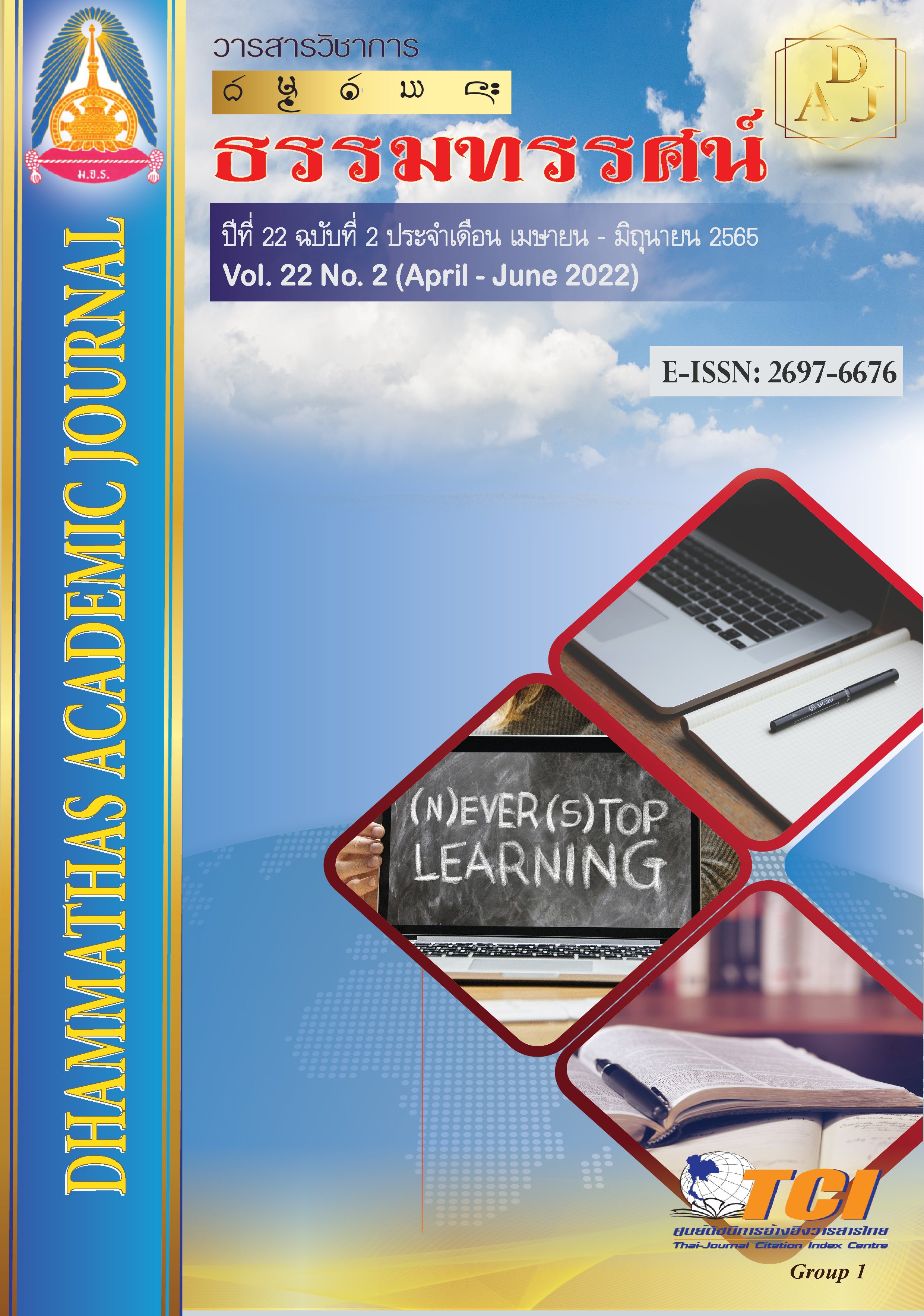Analysis of Astrology Influencing on the Quality of Life of People in Khon Kaen Province
Main Article Content
Abstract
The objectives of this research were: 1) to study astrology; 2) to study astrology influencing the quality of life of people in Khon Kaen Province; 3) to analyze astrology influencing quality of life of people in Khon Kaen Province. This study was qualitative research. The data were studied from primary and secondary documents and 35 key informants before being interpreted by the descriptive analysis based on the inductive method.
The research results were as follows:
1. Astrology is a subject that deals with human fortune-telling and phenomena of the world by determining the positions of stars in the sky as a pointer, recorded as statistic data that influences the way of life of human beings. Its content consists of 1) background, 2) meaning, 3) evolution, 4) cosmology, 5) elements of astrology, 6) types of astrology and 7) prohibition.
2. An astrology influenced the quality of life of people in Khon Kaen province in 3 aspects: 1) beliefs, 2) rituals and 3) lifestyles. These three aspects will influence the quality of life in terms of individuals and society.
3. The analysis of astrology was divided into 2 types: 1) Belief: astrology was related to the way of life from birth to death such as naming, finding auspicious times, performing rituals and rituals for the dead including the way of life such as house construction and marriage; 2) Knowledge: (1) rationalism: the cognitive competence of humans in acquiring knowledge, belief and rituals caused by reason that is a continuation of belief in the individual; (2) experimentalism: computational group and forecast group were the group that gained knowledge from experience by taking statistical records and then analyzed for predicting future phenomena.
Article Details

This work is licensed under a Creative Commons Attribution-NonCommercial-NoDerivatives 4.0 International License.
เพื่อให้เป็นไปตามกฎหมายลิขสิทธิ์ ผู้นิพนธ์ทุกท่านต้องลงลายมือชื่อในแบบฟอร์มใบมอบลิขสิทธิ์บทความ ให้แก่วารสารฯ พร้อมกับบทความต้นฉบับที่ได้แก้ไขครั้งสุดท้าย นอกจากนี้ ผู้นิพนธ์ทุกท่านต้องยืนยันว่าบทความ ต้นฉบับที่ส่งมาตีพิมพ์นั้น ได้ส่งมาตีพิมพ์เฉพาะในวารสาร วิชาการธรรม ทรรศน์ เพียงแห่งเดียวเท่านั้น หากมีการใช้ ภาพหรือตารางของผู้นิพนธ์อื่นที่ปรากฏในสิ่งตีพิมพ์อื่นมาแล้ว ผู้นิพนธ์ต้องขออนุญาตเจ้าของลิขสิทธิ์ก่อน พร้อมทั้ง แสดงหนังสือที่ได้รับการยินยอมต่อบรรณาธิการ ก่อนที่บทความจะได้รับการตีพิมพ์References
ธวัช ปุณโณทก. (2528). ความเชื่อพื้นบ้านอันสัมพันธ์กับชีวิตในสังคมอีสานในวัฒนธรรมพื้นบ้าน. กรุงเทพฯ: จุฬาลงกรณ์มหาวิทยาลัย.
บุญชัย มาลัยศิริรัตน์. (2533). โหราศาสตร์กับนโยบายศาสตร์: ศึกษาการนำโหราศาสตร์เข้ามาช่วยในการตัดสินใจของนักบริหาร. (วิทยานิพนธ์รัฐประศาสนศาสตรมหาบัณฑิต). กรุงเทพฯ: จุฬาลงกรณ์มหาวิทยาลัย.
ประมวณ วรรณโชติผาเวช. (2551). การประเมินความแม่นยำของโหราศาสตร์ไทยในการพยากรณ์ลักษณะส่วนบุคคล และพฤติกรรมในการทำงาน. (การศึกษาค้นคว้าอิสระบริหารธุรกิจมหาบัณฑิต). เชียงใหม่: มหาวิทยาลัยเชียงใหม่.
พระยาบริรักษ์เวชการ. (2535). หลักโหราศาสตร์ทั่วไปมูลฐานของโหราศาสตร์และประโยชน์ของการศึกษาโหราศาสตร์มรดกแห่งโหรสยาม สมาคมโหรแห่งประเทศไทย. กรุงเทพฯ: มิตรสยาม.
มานพ นักการเรียน. (2555). พระพุทธศาสนากับความเชื่อเรื่องโหราศาสตร์. กรุงเทพฯ: มหาวิทยาลัยมหามกุฏราชวิทยาลัย.
ยอดธง ทับทิวไม้. (2534). โหราศาสตร์ไทย (เรียนด้วยตัวเอง). กรุงเทพฯ: เดลฟี.
ราชบัณฑิตยสถาน. (2525). พจนานุกรมศัพท์ปรัชญา ฉบับราชบัณฑิตยสถาน. กรุงเทพฯ: ราชบัณฑิตยสถาน.
สถิต ภาคมฤค และคณะ. (2560). คุณค่าทางวัฒนธรรมของโหราศาสตร์ชาติพันธุ์ในแอ่งสกลนคร. รมยสาร, 15(2), 67-74.
สุชา จันทร์เอม. (2524). จิตวิทยาสังคม. กรุงเทพฯ: ไทยวัฒนาพานิช.
อุเทนี มนเทียรทอง. (2534). โหราศาสตร์ไทยกับการวางแผนและควบคุมธุรกิจธนาคาร. (วิทยานิพนธ์บริหารธุรกิจมหาบัณฑิต). กรุงเทพฯ: มหาวิทยาลัยเกษตรศาสตร์.

